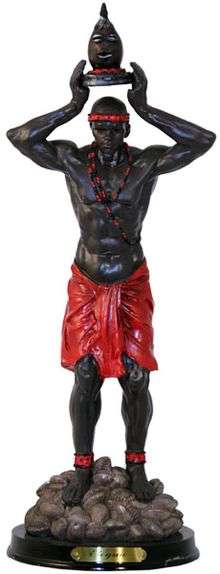Elegua
Elegua (Yoruba: Èṣù-Ẹlẹ́gbára, also spelled Eleggua; known as Eleguá in Latin America and Spanish-speaking Caribbean islands) is an Orisha, a deity of roads in the religions of Santeria (Santería), Umbanda, Quimbanda, Candomblé and in Palo Mayombe. He is syncretized with either Saint Michael, Saint Anthony of Padua, or the Holy Child of Atocha.[1][2]
| Elegua Èṣù-Ẹlẹ́gbára | |
|---|---|
| Member of Orisha | |
 Elegua depicted as a young man | |
| Other names | Eleggua, Eleguá |
| Venerated in | Yoruba religion, Santería, Candomblé |
| Region | Nigeria, Latin America, |
| Ethnic group | Yoruba people |

In Africa
Elegua is known as Èṣù-Ẹlẹ́gbára in the Yoruba religion and is closely associated with Eshu. Ẹlẹ́gbára means the "master of force" in the Yoruba language.[1][2]
Santería
Eleguá is known in Cuba and Puerto Rico as the orisha and "owner" of caminos, or roads and paths. All ceremonies and rituals in Santería must first have the approval of Eleguá before progressing. He is the messenger of Olofi. Within the "Regla de Ocha" [Cuba], he slightly differs from Echu, who in this case is seen as his brother, by having less dangerous and less aggressive characteristics. Eleguá moves silently; in contrast, Echu "breaks through". Manifestations of Eleguá includes Akefun, Aleshujade, Arabobo, Awanjonu, Lalafán, Obasín, Oparicocha, and Osokere.[2]
There is a patakí (story) in Santería in which Olodumare gives Eleguá the keys to the past, present, and future; for this reason, Eleguá is often depicted holding a set of keys. A figure of Eleguá may be placed in the house behind the entrance door.[2]
In Brazil
In Afro-Brazilian religion Elegbara is one of the titles of Exu.[2]
See also
References
- Adeoye, C.L. (1989). Ìgbàgbọ́ àti ẹ̀sìn Yorùba (in Yoruba). Ibadan: Evans Bros. Nigeria Publishers. p. 123. ISBN 9781675098.
- Lopes, Nei (2004). Enciclopédia brasileira da diáspora africana. São Paulo, SP: Selo Negro Edições. p. 252. ISBN 9788587478214.
External links
- Santeria cubana :: Tratado de Eshu-Elegbara
- Santeria.fr :: All About Eleggua
- Santeria.fr :: Todo Sobre Eleggua
- Santeria.fr :: Tout sur les Eleggua